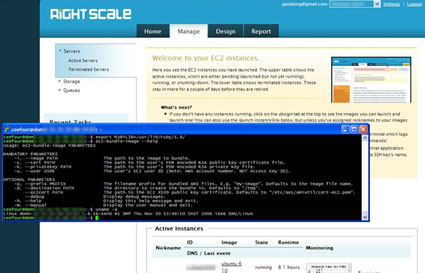Amazon’s EC2: Automated Server Hosting
EC2 is a new server clustering services by Amazon. The difference between traditional servers it’s that this is very on-demand and automated. You won’t need to phone call an admin and “hey, we need a server” anymore, all you have to do is click “launch” and you’ve got a server running. (and the billing starts too, hehhee…)
This is indeed a brand new technology that I haven’t heard other competitor yet. (Besides, when you’re competing with a company called Amazon, well……) It allows developers to create a server in less than a few minutes… and disband them at will as well. It’s even quicker than installing Linux in your own computer. 🙂
Amazon started as online book store, but now it’s grown to be one of the strongest Internet companies. 🙂 They built AWS / Amazon Web Services to provide hosted services. S3 and EC2 is among the most popular AWS services. S3 is a (massive) data hosting / storage service. And EC2 is hosting service. These are mostly interesting for developers, not end-users.
EC2 is similar to semi-dedicated / VPS (virtual private server) hosting services out there, with significant difference:
- Server instances are commissioned (and “deleted”) on-demand, by using an automated API (“API” word again..!) or by using web-based UI provided by RightScale. This means no need to call customer support for these kinds of stuff.
- Payment is per bandwidth and per hour used. No usage = no pay. Much usage = more cost. 🙂 This is different than any other hosting companies since they charge a fixed “$xx / month for xx GB bandwidth etc.” This also means EC2 has no cap on upper usage limit… as long as you pay what you used 🙂
EC2 is controlled using programmable Web Services API. RightScale is the web-based front-end UI that can be used by “mere mortals”, it hides the API complexity.
EC2 servers can be anything you like (web/database/Java/etc.). (Presumably as long as you use Linux?). They’re hosted on Amazon so it fits well if you want a remotely hosted server. It’s more convenient in some ways since you’re free-ed from managing the little details (such as when hardware burns out, memory/hard disk crash, etc. they handle it for you) but you still retain complete access to the server (since you’ll be logging in as ‘root’ user, you can basically do anything there).


